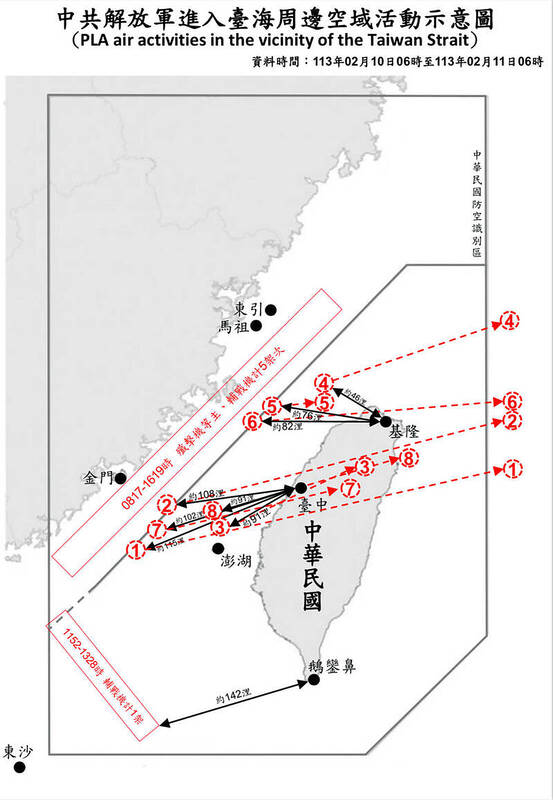A record six Chinese balloons flew across Taiwan between 6am on Saturday and 6am yesterday, the Ministry of National Defense (MND) said.
In its daily report on Chinese military activities, the ministry said that the six balloons were among eight that crossed the median line of the Taiwan Strait during the 24-hour period.
The eight balloons were detected between 10:05am and 3:34pm on Saturday at altitudes of 3,658m to 10,668m, it said.

Photo courtesy of the Ministry of National Defense
Of the six that crossed Taiwan, some flew over Keelung in the north, while the others flew near Taichung, it added.
The ministry did not comment on the type of balloons involved or say why Beijing had sent them across the median line.
The median line in the Taiwan Strait served for decades as a tacit border, but the Chinese military has sent more aircraft, warships and drones across it since then-US House of Representatives speaker Nancy Pelosi visited Taiwan in August 2022.
Saturday and yesterday marked the first day and second day of the new lunar year, which is celebrated on both sides of the Taiwan Strait, as well as by Chinese communities across the globe.
A military spokesman last month said that the daily sending of balloons to Taiwan was part of Chinese “gray zone” tactics in the run-up to the presidential and legislative elections on Jan. 13 and meant to “harass and rattle Taiwanese.”
The military has generally assessed the balloons as being for meteorological purposes, a conclusion drawn in part from its investigation of balloon debris found in February last year around Dongyin Island (東引).
The ministry last year said that similar equipment had been regularly detected in the air and sea around Taiwan, most often between December and February, because seasonal winds bring the balloons closer to Taiwan.
Speaking at a press event on Jan. 9, Colonel Wang Chia-chun (王家駿), deputy head of ministry’s joint operations planning section, said that shooting down the balloons would be “a waste of ammunition” and the exact response China wants from Taiwan.
Taiwan’s standard military response is to issue alerts to the relevant authorities and to closely monitor the balloons’ movements, particularly if they are found to be flying near more densely populated areas, he added.

NATIONAL SECURITY THREAT: An official said that Guan Guan’s comments had gone beyond the threshold of free speech, as she advocated for the destruction of the ROC China-born media influencer Guan Guan’s (關關) residency permit has been revoked for repeatedly posting pro-China content that threatens national security, the National Immigration Agency said yesterday. Guan Guan has said many controversial things in her videos posted to Douyin (抖音), including “the red flag will soon be painted all over Taiwan” and “Taiwan is an inseparable part of China,” while expressing hope for expedited “reunification.” The agency received multiple reports alleging that Guan Guan had advocated for armed reunification last year. After investigating, the agency last month issued a notice requiring her to appear and account for her actions. Guan Guan appeared as required,

A Vietnamese migrant worker yesterday won NT$12 million (US$379,627) on a Lunar New Year scratch card in Kaohsiung as part of Taiwan Lottery Co’s (台灣彩券) “NT$12 Million Grand Fortune” (1200萬大吉利) game. The man was the first top-prize winner of the new game launched on Jan. 6 to mark the Lunar New Year. Three Vietnamese migrant workers visited a Taiwan Lottery shop on Xinyue Street in Kaohsiung’s Gangshan District (崗山), a store representative said. The player bought multiple tickets and, after winning nothing, held the final lottery ticket in one hand and rubbed the store’s statue of the Maitreya Buddha’s belly with the other,

‘NATO-PLUS’: ‘Our strategic partners in the Indo-Pacific are facing increasing aggression by the Chinese Communist Party,’ US Representative Rob Wittman said The US House of Representatives on Monday released its version of the Consolidated Appropriations Act, which includes US$1.15 billion to support security cooperation with Taiwan. The omnibus act, covering US$1.2 trillion of spending, allocates US$1 billion for the Taiwan Security Cooperation Initiative, as well as US$150 million for the replacement of defense articles and reimbursement of defense services provided to Taiwan. The fund allocations were based on the US National Defense Authorization Act for fiscal 2026 that was passed by the US Congress last month and authorized up to US$1 billion to the US Defense Security Cooperation Agency in support of the

CLASSIFIED BRIEFING: The ministry said the special budget focuses on building a comprehensive defense system and strengthening the domestic defense industry The Ministry of National Defense yesterday released information on seven categories of weapons systems to be procured under a stalled NT$1.25 trillion (US$39.57 billion) special defense budget, including precision artillery, long-range missiles, air defense anti-tank missiles and more than 200,000 uncrewed aerial vehicles (UAVs). The Executive Yuan approved a draft version of the budget on Nov. 27 last year and submitted it to the legislature for review. The legislature’s Foreign Affairs and National Defense Committee yesterday invited Minister of National Defense Wellington Koo (顧立雄) to deliver a classified briefing and answer questions at a closed-door session. Koo said he hoped to provide lawmakers